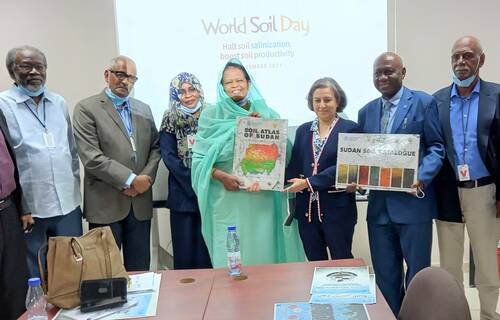World Soil Day celebration - Halt soil salinization, boost soil productivity at FAO Sudan
5 December 2021 | FAO Sudan, Ministry of Agriculture and Forest, The French Embassy in Khartoum, University of Khartoum, Agriculture Research Corporation (ARC)

SUMMARY OF THE COMMEMORATION
- ACTIVITY: Celebration of the 2021 World Soil Day
- LOCATION: Food and Agriculture Organization of the United Nations - Khartoum
- DATE: 5th December 2021
- WHO: Ministry of Agriculture and Forest, FAO Khartoum, The French Embassy in Khartoum, University of Khartoum, Agriculture Research Corporation (ARC)
- WHAT: Speech, presentation, video, distribution of Sudan Soil Atlas and Catalogue
- INVITEES: Relevant Government Ministries/Agencies, Private Sector, Donors, Heads of UN agencies etc.
- TARGET AUDIENCE: Relevant Government Ministries/Agencies, Private Sector, Donors, Heads of UN agencies, Media, etc.
BACKGROUND
World Soil Day (WSD) is held annually on 5 December as a means to focus attention on the importance of healthy soil and to advocate for the sustainable management of soil resources. An international day to celebrate soil was recommended by the International Union of Soil Sciences (IUSS) in 2002. Under the leadership of the Kingdom of Thailand and within the framework of the Global Soil Partnership, FAO has supported the formal establishment of WSD as a global awareness raising platform. The FAO Conference unanimously endorsed World Soil Day in June 2013 and requested its official adoption at the 68th UN General Assembly. In December 2013, the UN General Assembly responded by designating 5 December 2014 as the first official World Soil Day.
The Goal is to raise the awareness about:
1. Soil salinization and sodification are major soil degradation processes threatening ecosystem and are recognized as being among the most important problems at a global level for agricultural production, food security and sustainability in arid and semi-arid regions.
2. Salt-affected soils have serious impacts on soil functions, such as in the decrease in agricultural productivity, water quality, soil biodiversity, and soil erosion. Salt-affected soils have a decreased ability to act as a buffer and filter against pollutants. Salt-affected soils reduce both the ability of crops to take up water and the availability of micronutrients. They also concentrate ions that are toxic to plants and may degrade the soil structure.
WRAP-UP OF THE ACTIVITIES
The event took place on 5th of December 2021 at the Food and Agriculture organization of the United Nations - Khartoum, Sudan. It was witnessed by the French Ambassador to Sudan HE Raja Rabia and the Vice Chancellor of University of Khartoum among other dignitaries. Five hundred copies of the Soil Atlas of Sudan and the Soil Catalogue of Sudan were published for distribution to stakeholders in Sudan. The first set of 100 Copies was presented to the University of Khartoum. The publication of the two documents was made possible thanks to the financial support of RNE Reliance Team.
